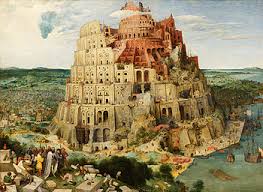I normally wouldn't be posting today, but since I have an 8 AM dental appointment and don't have to go to work first, I thought I'd use the bonus time to ruminate on one of my favorite subjects: language. Read on, if you're so inclined ...
As a linguist and a lover of language, I found this article from Time Magazine to be very interesting: Understanding How the Brain Speaks Two Languages. There has long been debate about how we acquire language - if our brains are hard-wired from birth to find and master the patterns of sounds we hear those around us make, or if we just learn by memorization and repetition. And why can some people master multiple languages easily, while others struggle with just their native tongue? This is not a subject of interest just to those of us who love linguistic arcana ... wouldn't it be useful to understand how it is that politicians can speak out of both sides of their mouths and never be called out on it? The ability to speak more than one language is undeniably an advantage, not only for travelers who need to find the nearest bathroom or train station, but for coping with the unprecedented flood of refugees and immigrants, most of whom speak little or no English. Here's a question - how many of you, Dear Readers, can speak* more than one language?
Interested in languages, alphabets, writing systems, and related stuff? You can lose yourself in a wonderful website called Omniglot***.
Not interested in languages, alphabets, writing systems, and related stuff? Come back tomorrow for thoughts on another topic.
Have a good day. More thoughts tomorrow.
Bilbo
* By "speak," I mean, "be able to communicate on a basic level," not necessarily "deliver a major speech on higher mathematics."
** This is, of course, the story of the Tower of Babel. This cautionary tale gives us the word babble to describe confused and nonsensical speech, such as Republican economic theories, the Democratic party platform in general, and almost anything from Glenn Beck.
*** If you visit the Omniglot website and select "Links," it will take you to a large number of other fascinating language-related sites. It also has the usual list of disclaimers about lack of responsibility for external sites, and contains this fascinating disclaimer: "Some sites may contain traces of nuts."


Omniglot is an interesting site that bears looking into. I can speak two other languages, sorta, plus a regional patois.
ReplyDelete"Traces of nuts"..........got me hooked on the links!
ReplyDelete